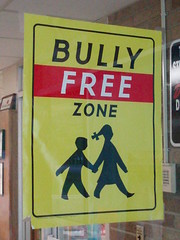What is bullying? What is cyberbullying? How do we see the signs if our children are being bullied? How do we help them? And what can we do to prevent this from happening? These were all major questions that treawere discussed during our February meeting.
Bullying and Cyberbullying occurs in almost all schools, to all demographics, and all ages. Bullying consists of consistent teasing, aggressive behavior, and/or threats. Bullying can cause long term self esteem issues and fear and is a serious problem that deserves the attention that it’s been getting.
The San Jose chapter of the Holistic Moms Network was extremely fortunate to have Kristen Wright, LMFT and Tamara Wade, LCSW speak with our chapter about the effects of bullying and cyberbullying on our children and teens. It was a wonderful meeting with several families attending and sharing experiences with bullying, how it was effecting them, and getting valuable support and advice on how to handle their situations.
Signs of Bullying
- Comes home with damaged or missing clothing or other belongings
- Reports losing items such as books, electronics, clothing, or jewelry – especially treasured, expensive, or cherished items
- Has unexplained injuries
- Complains frequently of headaches, stomachaches, or feeling sick
- Has trouble sleeping or has frequent bad dreams
- Has changes in eating habits
- Hurts themselves
- Are very hungry after school from not eating their lunch
- Runs away from home
- Loses interest in visiting or talking with friends
- Is afraid of going to school or other activities with peers
- Loses interest in school work or begins to do poorly in school
- Appears sad, moody, angry, anxious or depressed when they come home
- Talks about suicide
- Feels helpless
- Often feels like they are not good enough
- Blames themselves for their problems
- Suddenly has fewer friends
- Avoids certain places
- Acts differently than usual
Cyberbullying
Examples of cyberbullying include:
- Sending hurtful, rude, or mean text messages to others
- Spreading rumors or lies about others by e-mail or on social networks
- Creating websites, videos or social media profiles that embarrass, humiliate, or make fun of others
Bullying online is very different from face-to-face bullying because messages and images can be:
- Sent 24 hours a day, 7 days a week, 365 days a year
- Shared be shared to a very wide audience
- Sent anonymously
What to do if your child is bullied
If you feel your child is bullied – it is important to keep the lines of communication open. Instill trust in your child or teen by talking to them, listen, and do not react until a plan has been devised by all of you – taking your children’s desires into consideration. Some options in getting help through an anti-bullying program at your school, if one hasn’t been established – consider organizing one. Project Cornerstone is a great organization that helps implement volunteer anti bullying programs at schools. If possible, contact the teacher and school to let them know what is going on. If your child is receiving threatening or bullying text messages, emails, phone calls, etc – make sure to document and save all communications. Depending on the severity, make sure to show these to the teacher, school, or authorities. It was not advised to go directly to the parents of the bully without a mediator. Often times, emotions become too intense and the outcome is poor. If you are uncertain what to do in your situation and your school is not equipped to handle the situation, it is important to go to a therapist or organization that can help.
Take a Stand
The easiest way to stop bullying is to take a stand. Often times, children and teens are scared to be involved because they don’t want to become a victim also. There are tons of stories where one child tries to stand up for another and ends up becoming bullied also. But if we can teach our children to stand up to bullying as a group – it will stop. Bullies are able to bully because no one stops them – or worst, they join in with them. It’s important to help our children understand what happens when someone is bullied and how they can stop it by simply saying no, getting a parent, adult, or teacher involved, and by taking a stand to say they will not accept bullying. So many of our elementary schools are beginning to implement anti-bullying programs because they realize that teaching children to take a stand at a young age helps prevent bullying when they are tweens and teens.
Some Great Resources
- www.stopbullying.gov
- www.pacer.org
- www.commonsensemedia.org
- www.projectcornerstone.org
- www.myctap.org
- www.adinasdeck.com
- www.wiredsafety.org
- www.stopcyberbullying.org
- www.dosomething.org
- Peacebuilders.com book list for Teens
- Netsmartz.org resources – including real world safety and cyber safety pledges

Leave a Reply